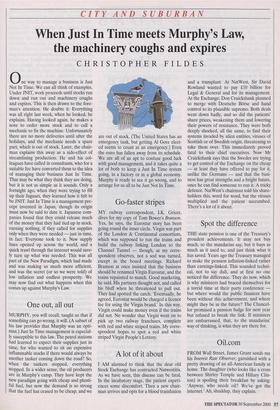CITY AND SUBURBAN
When Just In Time meets Murphy's Law, the machinery coughs and expires
CHRISTOPHER FILDES
One way to manage a business is Just Not In Time. We can all think of examples. Under JNIT, work proceeds until stocks run down and run out and machinery coughs and expires. This is then drawn to the fore- man's attention. He doubts it. Everything was all right last week, when he looked, he explains. Having looked again, he makes a note to order more stock and to call a mechanic to fix the machine. Unfortunately there are no more deliveries until after the holidays, and the mechanic needs a spare part, which is out of stock. Later, the chair- man explains this away as a side-effect of streamlining production. He and his col- leagues have called in consultants, who for a suitable fee have converted them to the idea of managing their business Just In Time. That may be what they think they are doing, but it is not as simple as it sounds. Only a fortnight ago, when they were trying to fill up their Jaguars, they learned how it felt to be JNIT. Just In Time is a management pre- cept invented in Japan, though its origin must now be said to date it. Japanese com- panies found that they could release much of the money that they had tied up in stock, earning nothing, if they called for supplies only when they were needed — just in time, in fact. Everyone took to it. New supply lines opened up across the world, and a quick trawl through the internet would sure- ly turn up what was needed. This was all part of the New Paradigm, which had made and was making us much more efficient, and was the secret (or so we were told) of low inflation and endless prosperity. We may now find out what happens when this comes up against Murphy's Law.


























































































 Previous page
Previous page